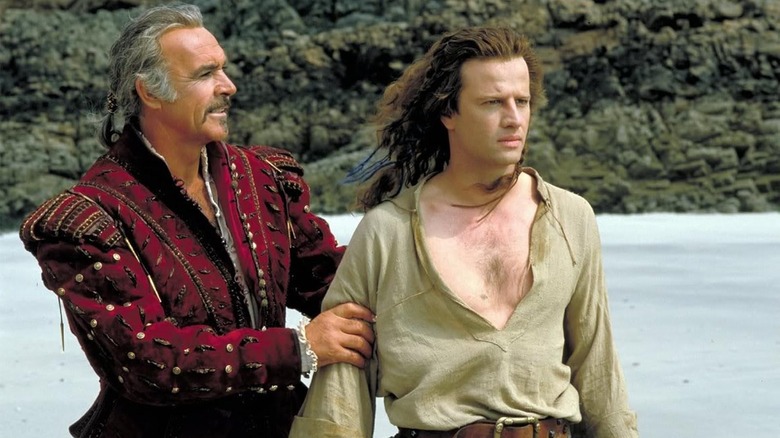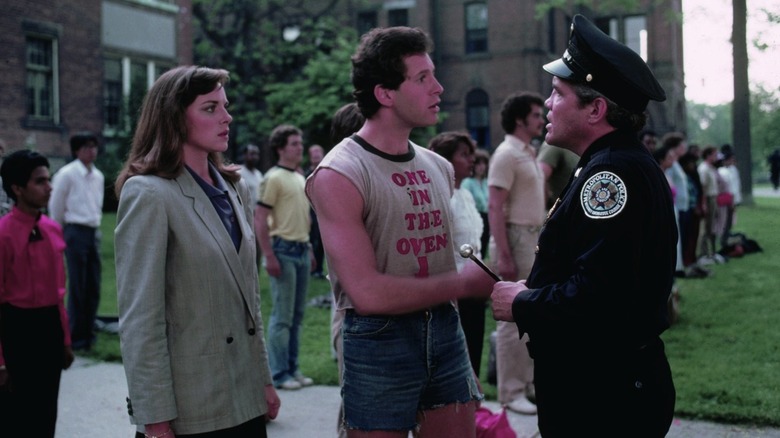The Highlander And Police Academy Series Have One Unfortunate Thing In Common
It is exceedingly rare in today's IP-dominated movie marketplace to see an original film spawn a long-running franchise. Granted, these motion pictures aren't always wholly original. But while they tend to be derivative of narrative formulas that have worked in the past, they are at least written from scratch with no significant assistance from a novel or a comic book or a video game or, nowadays, the origin story of a popular brand.
So, kudos to Gregory Widen and Paul Maslansky for possessing the creative chutzpah to launch two very successful franchises in, respectively, "Highlander" and "Police Academy." The former gave fans four feature installments over a 14-year-span, while the latter rattled off six entries once a year between 1984 and 1989 (and a late-in-the-day seventh with much of the same cast in 1994).
"Police Academy" was especially zeitgeisty, trafficking in the zany spoof gags made popular by the ZAZ team of David Zucker, Jim Abrahams, and Jerry Zucker ("Airplane!") without itself being a spoof. The movies were basically raunchy variations on Mack Sennett's silent Keystone Cops comedies, and, for whatever reason, they connected emphatically with moviegoers. Most importantly for Warner Bros., which released all seven films, they were made on the cheap and made loads of money at the box office. The first movie cost a total of $4.8 million and grossed $149.8 million worldwide. The entire movie series raked in a total of $537.8 million worldwide, but as the individual grosses tapered off and the budgets went up, WB lost its appetite for the crew's calcifying law-and-order antics.
"Highlander," starring Christopher Lambert and Sean Connery as immortal warriors, was a different deal commercially in that, with a $12.8 million worldwide gross on a $19 million budget, it lost money theatrically. The sequels also performed poorly at the box office. They were, however, hugely popular on video and cable, and went on to spawn a television series, an anime feature, novels and comic books.
So, what could possibly be "unfortunate" about two film series that made their creators a heapin' helpin' of cash?
The critics exhaustedly, angrily agree
I've been an avid movie fan since I could process media, and it is hard for me to think of two franchises that have evoked more critical opprobrium than the "Police Academy" and "Highlander" franchises. Even the first "Highlander," which boasts hyper-stylish direction from music video auteur Russell Mulcahy, drew almost exclusively raspberries upon its release in 1986.
As such, I'm not surprised to see that review aggregator Metacritic's ranking of the top 84 franchises slots the "Highlander" and "Police Academy" films in at 84 and 83, respectively.
Personally, I far prefer Metacritic to Rotten Tomatoes, largely because it enforces a higher critical standard (i.e. the site doesn't include opinions from dubious websites and low-information reviewers). It also sticks to contemporaneous reviews, so the ratings reflect how the movies were received in their day. And let me tell you, these low, low numbers accurately reflect just how much critics loathed these franchises.
When Gene Siskel said he felt like a baby being fed to a starving dog while watching "Highlander," he meant it. When you see him throw up his hands in weary agreement with his longtime reviewing partner Roger Ebert as they jointly realize "Police Academy 6: City Under Siege" is utterly review-proof, you feel his exacerbation. The only surprise here is that "Highlander II: The Quickening" rates a tick higher than the first "Highlander," even though fans of the franchise generally acknowledge that it's a massive step down in quality. What gives? If you look at the blurbs, the critics are finally starting to realize they've entered an era of mindless action movies driven by proficiently directed spectacle for spectacle's sake. This doesn't mean they'd come around on everything from the "Rambo" movies to the newfangled martial arts flicks from Jean Claude Van Damme and Steven Seagal, but they at least understood that these movies are aiming low and occasionally hitting their mark.
I think Metacritics' ranking correctly captures that franchises never aimed lower than "Police Academy" and "Highlander." But at least they did so in an original manner.

